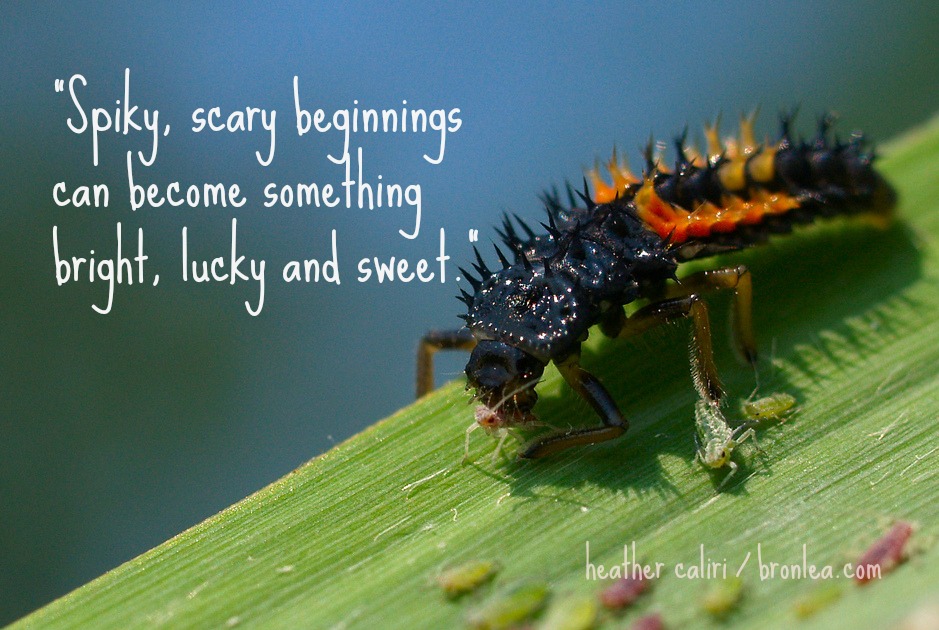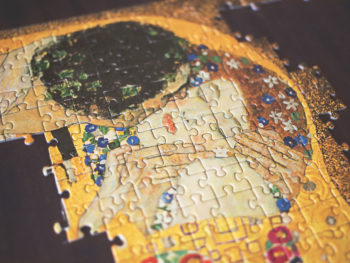 My sister called on a day that wasn’t working.
My sister called on a day that wasn’t working.
My three-month old daughter was supposed to nap at noon. Like most nights, I hadn’t slept well, and was exhausted instead of rested in the morning. I was hungry for sleep at 9, yearning by 10:23, biding time anxiously at 11:15 and 11:37.
When noon came around, I lay down with my baby in our big bed and tried to be patient while she fell asleep.
Except she didn’t.
Desperate, I tried, and tried again while she turned from side to side and gurgled and fussed when I didn’t pick her up to play.
Every minute that passed, I ran through why she wasn’t falling asleep. I’d gotten five different books on sleep, and tried, in my exhaustion, to decide which of the methods I should follow. All of them had suggestions, many conflicting, and all of them would need a level of commitment and sanity from me that I hadn’t had since before my child was born. I didn’t feel skillful enough or brave enough to do anything, but if I didn’t do something, I—well, I didn’t know what I’d do.
A year later, I’d see my darkness for what it was: depression. But at the time, I couldn’t see clearly enough to understand why my brain was going haywire.
All I knew was at the moment, the house felt like a cage.
A Phone Call that Changed Everything
My daughter fretted, and I fretted, and then I scooped her up, almost ran outside, and put her in the stroller.
Just as I rolled around the corner on our street, my cell phone rang. My sister, Katie.
“How are you?” she asked. Her voice sounded far away, cheerful. It made me want to cry.
“She didn’t sleep,” I said, my voice bitter. “She was just supposed to take a nap, and she didn’t, and I don’t know why.”
“Oh, honey, I’m sorry,” Katie said. “You’re doing great. You’re a great mom.”
My sister knew from motherhood—her own daughter was ten—but I shrugged my shoulders as if to flick off her affirmation before it sank in. “I feel like I’m doing everything wrong,” I said. “I feel like there’s something I could do that would make everything better—and I keep messing it up. I just wish I knew what to do.”
“Oh, Heather,” she said. “Oh, honey, you’re not doing anything wrong.”
“But I just—I read these books, and they have ideas, and I try them, and they kind of work, but then they don’t and I—“
“Heather, it’s just hard,” Her voice had changed. Instead of being reassuring, it was hot, emphatic. Suddenly I remembered that when her own daughter was small Katie had struggled too. Suddenly, I didn’t feel like shrugging her off.
She continued. “Sometimes with babies there’s nothing you can do. It’s not that you’re doing it wrong. It’s just hard.”
I considered her words. The idea that the exhaustion I felt wasn’t because of my bungling was like a small seed planted in my heart. It sent out tendrils into dry soil. The movement felt good. It felt like hope.
Katie’s voice softened again. “You’re doing the best you can,” she said. “You’re just doing your best. And that is okay.”
The Ordinary Miracle of the Ladybug
I breathed in, and breathed out, and noticed that the fall light was golden through the hedge on my left. In a year, my daughter would be walking, and we’d toddle along this very stretch of sidewalk. We’d find hundreds of ladybugs on the leaves of the sage-green bushes. Strange ladybugs, orange and light yellow and only an occasional red.
On the same branches, we’d find thorny, odd bugs, long as my fingernail, black and orange. I’d avoid them, sure they were poisonous.
But then I’d discover that the ugly bugs were simply ladybug larvae, repulsive in their infancy. I would not believe how much a ladybug could change. That a spiky, scary beginning could become something bright, lucky, and sweet.
I realized I’d been clutching the phone with aching fingers. I loosened my grip. “Thank you,” I said, meaning it. “Thank you. I needed to hear that.”
“You’re welcome,” Katie said. “I love you so much.”
She hung up, and I kept walking, getting ever closer to my own transformation.
Originally posted on Bronwyn Lea’s blog.
Photo Credit: Ladybug Larva/Eric Begin (Flickr Creative Commons), edited by Bronwyn Lea.













 Bill Cosby, Needles, Haystacks and Why Rape Culture Is Old News
Bill Cosby, Needles, Haystacks and Why Rape Culture Is Old News
I don’t want to have kids. I don’t think I can handle it. But one thing I’ve learned since I live in the same house with my niece and nephew, mothers do the best they can. Babies don’t come with a manual and they are not robots to be programmed to give the same results. Don’t beat yourself up. There isn’t anything more you could do.
Such wise words, Nana–they are NOT robots, and I’m so grateful to be around kids all day–they remind me that I’M not a robot, either 🙂 I really do have to be reminded of that, frequently 🙂
My daughter is 8 now–this happened quite a while ago. I’m thankful that I can have enough emotional distance from it, and can have SO much more compassion for myself than I was capable of back then. My kids have seriously changed how I view myself, and how gentle I am.
Definitely. After being chronically depressed and being in therapy for a decade, i have finally learned to be gentle with myself and remember that I cannot do everything like I used to. I don’t think God expects us either.
I think this is maybe why Jesus says the brokenhearted are blessed: because that kind of wisdom only comes through real pain, no? Much love and blessing to you in your healing.